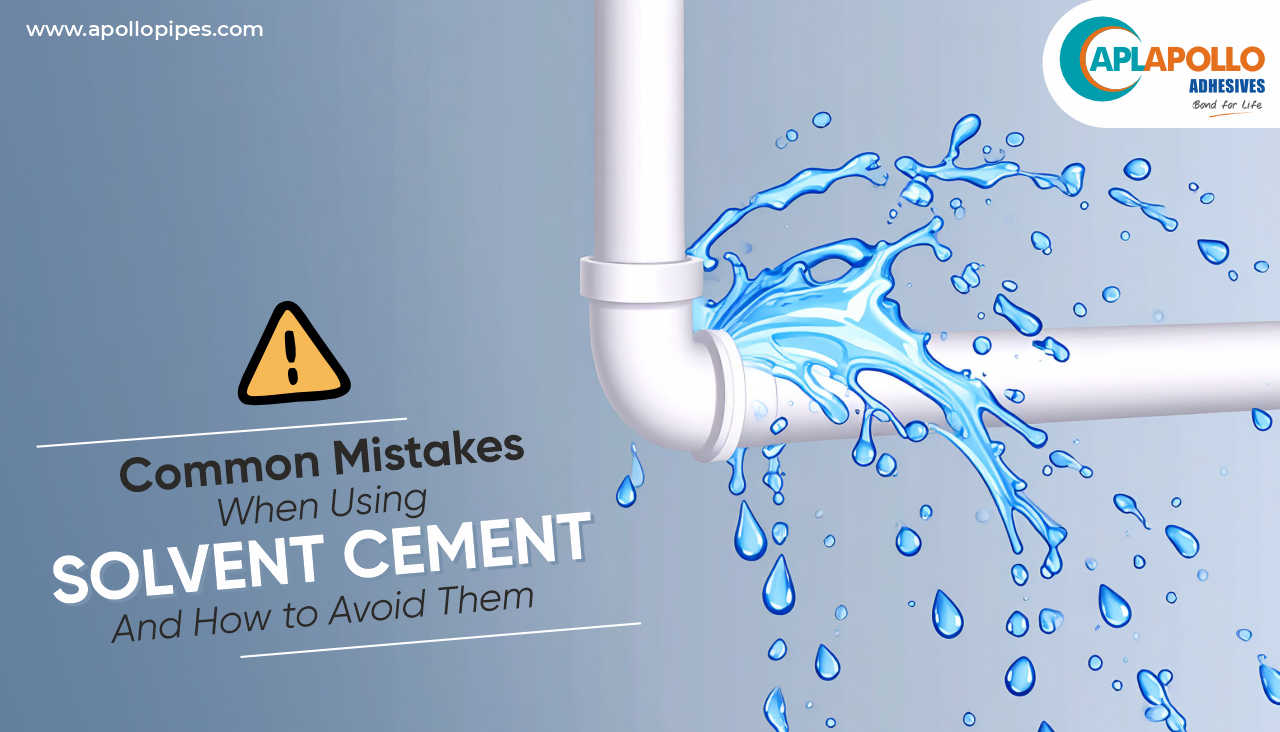Solvent cement is an essential adhesive used in plumbing and piping systems, especially for joining PVC (Polyvinyl Chloride), CPVC (Chlorinated Polyvinyl Chloride), and UPVC (Unplasticized Polyvinyl Chloride) pipes and fittings. It softens the surfaces of the pipes and fittings and create a fused joint on drying. While it seems like a straightforward process, improper application of solvent cement can lead to weak joints, leakage, or complete system failure.
To ensure long-lasting and reliable results, it's crucial to understand the common mistakes associated with solvent cement and how to avoid them. In this blog we are exploring these point.
- Not Cleaning the Pipe and Fitting Properly
One of the most common mistakes when using solvent cement is failing to clean the pipe and fitting surfaces thoroughly. Dirt, moisture, or even small particles can interfere with the chemical bonding process. Therefore, we need to clean the surfaces to be joined with a clean, dry cloth, for best results, use a PVC cleaner or primer before applying solvent cement ensuring that the bonding surfaces are free from contaminants and ready for proper adhesion.
- Using the Wrong Type of Solvent Cement
Not all solvent cements are created equal. Using a general-purpose cement for CPVC or UPVC pipes can lead to weak bonds because these materials require different formulations for proper bonding. It is crucial to choose the correct type of solvent cement specific to the material you are working with, always read the manufacturer’s label for compatibility.
In certain cases, especially with CPVC or when dealing with cold weather conditions, using a primer before applying solvent cement is essential. Some users skip this step, thinking it is optional.
It is better to use a primer recommended by the solvent cement manufacturer if needed, the primer softens and preps the surface, allowing for deeper penetration of the cement and stronger joint formation.
Applying too little or too much solvent cement can both cause problems. Insufficient application can lead to dry joints, while excess cement can pool inside the pipe, reducing flow or causing blockage.
- Delayed Assembly After Application
Solvent cement starts to evaporate and set quickly. If you wait too long after applying it before joining the parts, the bond may not form correctly. We need to join the pipe and fitting immediately (within 30 seconds) after applying the cement, push and twist the pipe into the fitting to ensure an even distribution of cement.
- Not Holding the Joint in Place
Once the pipe is inserted into the fitting, many users release it too quickly, which can cause the pipe to push out slightly due to hydraulic pressure from the cement. To ensure the bond sets and the pipe does not slide out you need to hold the joint together firmly for at least half minute.
- Failing to Allow Proper Curing Time
Turning on the water supply too soon after assembling the joints is a common mistake. Without sufficient curing time, the joint may not have achieved full strength and it may leak. You need to allow the joint to cure according to the manufacturer’s instructions. Typically, 15–30 minutes is recommended for initial setting, and up to 24 hours for full curing, depending on the pipe size.
- Working in Poor Environmental Conditions
Extreme temperatures, humidity, or rain can impact the effectiveness of solvent cement. Working in very cold or very hot environments without adjustments can compromise the bond. You should avoid applying solvent cement in wet conditions. If working in cold weather, use a product formulated for low temperatures and allow additional curing time. Store cement in a temperature-controlled environment.
Solvent cement has a shelf life. Over time, its effectiveness deteriorates, and using expired cement can result in weak joints. Always check the manufacturing date and expiration date on the can.
APL Bond Solvent Cement
Even the high-quality pipes are effective when securely joined into a reliable system. To ensure sturdy, long-lasting, and leak-proof joints APL Apollo’s solvent cement prepared under strict quality control and comes in three variants: CPVC, uPVC, and PVC to different piping needs.
APL solvent cement stands out for its superior quality and fast-setting formula, allowing for quick and efficient installations. Whether for plumbing, irrigation, or industrial applications, this solvent cement ensures durable and seamless connections. You may rely on APL Bond solvent cement which is perfect partner for robust, leak-free piping systems.


